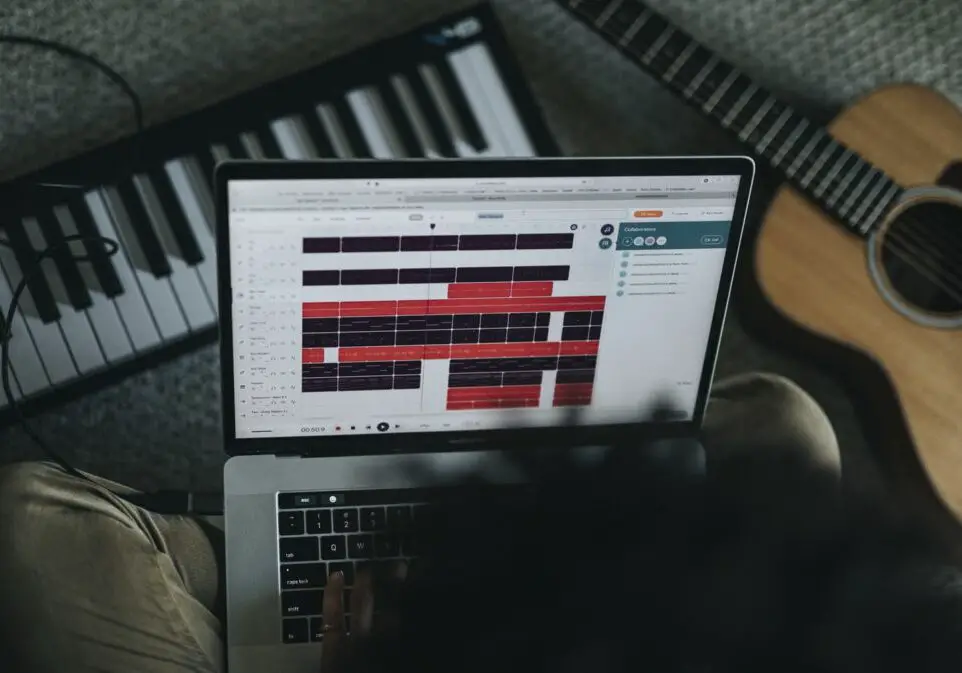Whether you’ve got “writer’s block” or you’re just having a hard time feeling inspired, sometimes all you need is a few songwriting prompts to push in the right direction.
Coming up with a great concept is crucial to writing a great song. Sometimes prompts can be extremely helpful in coming up with good songwriting ideas.
You don’t need to write directly to the prompts, but instead use them to spark inspiration — which is everything!
Sometimes inspiration comes in the writing room.
But if you know you’re the type of writer that needs to have content prepared before you head into a writing session (as opposed to finding your title in the room) then you need to be prepared.
My recommendation is for you to do this work an hour before you go into the room.
I always try to block off 30 minutes to an hour before every writing session to just get my brain into a creative space and forget about whatever else is going on.
Block distractions. Don’t look at emails. Don’t check your calendar. Just get the juices flowing.
Even if you aren’t the kind of person who needs to be prepared, this is a good exercise. Set time aside some time before you start writing, whether it’s 15 minutes, 30 minutes, or more.
Give yourself space to feel creative so you can hit the ground running and not feel stale.
Songwriting prompts can be anything that gets your brain working.
I have friends who keep slips of paper with random words or sentences written on them on their coffee tables, in their studios, or in their writing rooms.
Whenever they’re stuck, they reach into the bucket and grab one of these little slips of paper. It might be something that doesn’t help at all. It might be something funny that gets them thinking creatively.
Either way, those slips are a good tool to have handy to avoid trying to beat a lyric, melody, or concept to death until you’re worn out and not feeling creative anymore.
Before you get to that point, try using some of these prompt ideas to get your creativity flowing again — and don’t be afraid to add your own slips to this list.
A note before we begin: Although many of these questions are for you, that doesn’t mean you’ll write the song in first person. Instead, make the subject of the song a fictional character.
Actions — Paint vivid pictures for your listeners.
1. Singing. At the top of your lungs or under your breath.
2. Dancing. Alone, down the street, or somewhere unexpected.
3. Eating or drinking. Enjoying your favorite foods or (surprising, unusual) drink.
4. Rocking out. At a concert, in a club, on the beach, at the drive-in, or on a rooftop.
5. Dreaming. What would you do if you could do anything? Have you given up on any dreams? What might you try again?
6. Talking. Having a tough conversation, having a great conversation, talking all night, quitting talking to do something else.
7. Listening. What if you loved the sound of someone’s voice or the way they look when they’re animated?
8. Flirting. What do you wish you had the nerve to say to someone? Describe an embarrassing situation.
9. Hugging/Kissing. Who do you want to embrace, when, where, and for how long?
10. Imbibing. What’s a crazy, hilarious, or ridiculous reason to get drunk?
11. Hangovers. Recommend an insane or humorous cure.
12. Weed. Legal now in many places. Write about the vibe.
13. Abstaining. Avoiding the above intoxicants for an unorthodox reason.
Angles — Approach song ideas from different perspectives.

14. Humorous. Poke some fun or laugh a little about life.
15. Contrary. Take an opposing approach to mainstream or conventional wisdom.
16. Snarky. Be a little tongue-in-cheek.
17. Encouraging. Reassure listeners, motivate and inspire them.
18. Hyped up. Go a little over the top with excitement.
19. Cautionary. Don’t let someone else make the same mistakes.
20. Angry. Sound off! (But don’t overuse this, too much can turn people off.).
21. Lighthearted. Take a laid-back approach to a serious topic or story.
22. Feelgood. Give listeners the warm fuzzies.
Emotions — Write about feelings we all share.
23. Happiness. What does it mean? Describe a place, a person, a thing, an activity, etc.
24. Calm. What are you doing when you’re completely chilled out? How do your listeners get back to that state of mind?
25. Confidence. Imagine being on top of the world and sure of yourself. What’s that story? What did you or your character overcome? How?
26. Sadness. What advice do you give to a friend when they’re down? How can/why should someone embrace tears?
27. Fear. What scares you? How do you push through or help someone else do it?
28. Shame. Write a funny story about remorse or embarrassment.
29. Anger. What’s a lighthearted, bad example of dealing with frustration or rage?
30. Anxiety. Soothe someone’s mind.
31. Hope/Hopelessness. What do you aspire to do when you feel either of these?
32. Overwhelm. Help someone bounce back or take charge again. Tell them to run away.
33. Jealousy. Relationship envy is common, write about another kind of envy.
Events — Honor big days, little victories, and the stuff of life.
34. Celebrations. What big or little thing do you have to celebrate? Where are you? Who’s there with you? What will you do?
35. Falling in love. What was going on when you fell in love? Fell out of love? Knew it was over? Knew it was forever?
36. Dances. Describe dancing with a partner you love. What if someone’s a bad dancer? Suggest skipping the dancing to do something else. Dance party with friends.
37. Sports. Write an ode to a sport, fans, or a sports team.
38. Seasonal activities. Write about summer fun, spring breezes, fall bonfires, or winter trails.
39. Holidays. Write a holiday song (doesn’t have to be Christmas.) Write a birthday or anniversary song you can adapt for anyone.
40. Vacation. Where will you go? How long? What will you do? Describe your best one or dream one.
41. Travel. Getting away from it all, flying, driving, trains, a trip around the world or country. Relive or dream up a road trip.
Good times/bad times — We all have ’em, so commiserate.
42. A perfect day. Actual or imagined, what’s yours? How would you give one to someone?
43. A bad day. Describe having one, recovering from one, rescuing someone from one.
44. A typical day. Write about joys, sorrows, favorite things, simple things.
45. A weekday. What happens? Why do you love or hate Sundays, Mondays, etc.?
46. A particular day. Name a month, or date/month/year. Tell that story.
47. A time of day. Set a story during breakfast, lunch, or dinner, or at a certain time of day or night.
48. Timing. It’s about time we X, it’s too late for Y, there’s never a good time for A, it’s never too late for B.
49. Experience. Immerse yourself in quiet, noise, bright light, darkness, cool shade, blaring sun. At sunrise, sunset, or during a storm. What happens?
Creative inspiration — Creativity thrives within constraints. Have some fun!
50. “Pilfer” from other songs. Completely rewrite the lyrics from a favorite song, then completely change the chords.
51. Play with song structure. Write a bare bones Verse-Chorus- Verse-Chorus- Bridge-Chorus. Write only verses. Start your song with a chorus or part of chorus
52. Limit yourself. Use only two chords or three chords. Use only 12 words. Use only percussion and melody.
53. Riff. Expand on other song, movie, book, or game titles. Build on them or write the complete opposite.
54. Switch it up. Swipe a chord progression from an existing song, and play it backwards or mix it up.
55. Make a wish. Everyone has a popular song they wish they’d written. Take your best shot at something that makes you feel the same way.
56. Flip the emotion. Write an uplifting song in a major key about heartbreak or another sad topic, or a positive song in a minor key.
57. Bite your tongue. Avoid using common words like “love” or “you.”
58. Alphabetize. Force yourself into starting lines with letters A-Z, in order.
59. Rhyme. Use one obscure, challenging rhyme scheme or avoid a popular one.
Life inspiration — Music changes lives. Here’s how.
60. Encourage. Tell stories that help people to keep going, speak up, be themselves, be kind, teach, share, stand strong, have faith, build a better world, be a light in darkness, rise up, follow their dreams, strive, never give up, bounce back, try again, rebound, get support, give support.
61. Paint pictures. Describe community, your fellow man, gratitude, appreciation, friendship, help, loneliness, forgiveness, fun.
62. Have no regrets. How do you want to look back on your life? What do you want people to say at your funeral?
63. Speak up. What would you love to rant about? What positive actions would you take instead?
64. Last one standing. What if you were the last person/people on Earth? Or the last one at a party?
65. Values. What matters most to you? What do you stand for?
Music — Song themes from your personal experience.

66. Touring. Describe a musician’s life on the road (or missing it during lockdown.)
67. Performing. Tell a story of owning the stage, flopping terribly, or playing for only 1 or 2 people (purposely or not.)
68. Creative process. Write a song about writing songs or performing. What do you love about it?
69. Music. What does music mean to you? How has music/art/creativity saved or improved your life?
70. Struggles. What’s hard about being a musician? Lack of privacy, being away from home, baring your soul, chatting up strangers, balancing life offstage, etc.
71. Celebrities. Describe a famous person’s artistic, scientific, social, or creative achievements.
Nostalgia — Make listeners remember the past fondly.
72. History. Tell stories of historical figures, your ancestors, grandparents, or great grandparents.
73. School days. Write about grade school, high school, or college experiences.
74. Better days. Were they in the past? Are they coming soon?
75. Today. Why is now the best time to be alive?
76. Inspired by real life. Describe your dad, mom, kids, life lessons, siblings, friends, classmates, partners, memorable vignettes.
77. Youth. What did your younger self dream? What crazy things did you do?
People — Find endless songwriting inspiration in the human condition.
78. Woman. An independent, unusual, or unforgettable woman. One who will never settle down. One you never want to go head-to-head with.
79. Man. A guy who’s ready to settle down. One who’ll never amount to anything, or who’s thrown everything away. The best man you’ve ever known.
80. Physical traits. Eyes that are green, brown, black as night or hazel. A laughing, sad, or lonely face. Curly hair, the brightest smile.
81. Personality traits. Someone with strength, persistence, bravery, or a wicked sense of humor. One who’s straightforward, accepting, abrasive, sincere, honest, or smart.
82. Authenticity. Someone who’s easy to figure out, two-faced, or misunderstood.
83. Kids. Write about animals, friends, games, parents, siblings, school, life lessons, or dinosaurs.
84. Fantasies. Pick a superpower. What would you love to have and why?
85. Baby names. Choose one at random from a list and tell that person’s story.
Places — Write songs that take listeners on a journey.
86. Childhood home. Describe where you grew up and your memories.
87. Ode to a town. Could be yours or another. What’s special about it? Why?
88. College town. Tell a coming of age story.
89. Home. Where is home? Maybe home is anywhere. Why? What is it instead?
90. Locations. A favorite store, river, lake, mountain, ocean, racetrack, forest, city, cabin, beach, or amusement park.
91. Home away from home. How’s it different from your real home? How do you adapt?
92. Other worlds. Describe or imagine other countries, planets, even universes. (90)
Relationships — Get infinite song ideas from getting along.

93. New love. Imagine a brand-new relationship unlike any you’ve had before. Or maybe it feels familiar already.
94. Love song. Express appreciation for a long-time relationship. Imagine the fire’s still burning, or it’s petering out.
95. Longing. Write a love song to someone you know you’ll never have.
96. Family love. Describe the ups and downs of family life.
97. Friend love. Tell a story about best friends forever.
98. Surprising love twist. Write a love song to your dog, car, or beer (without naming it).
99. Revenge song. Dream up your best, most ridiculous payback scenario.
100. Breakup song. Are you heartbroken? Maybe you’re okay with it. What do you want to say that you can’t? Breakup with a habit instead of a person.
101. Conflict. Describe a silly fight. Dream about how you’d make up.
102. Memories. Tell the story of a first love, of a tough love, of a summer love, a brief fling, the one that got away.
103. Hope and endurance. What are the ways to make love last?
104. Love as war. How does it make you feel? What do you do about it?
105. Complications. When does love get complicated? How do you keep it simple? Describe a love triangle or impossible situation.
Twists — Turn those songwriting tropes on their heads.
106. Parties. What’s a party without beer? A wine tasting gone wrong?
107. Country. A country song about loving life in a city.
108. Gender benders. Describe a handsome man’s looks and wardrobe.
109. Bummers. Tell a story about the worst bar or party ever.
110. Refocus. Write a song for a female lead singer.
111. Unusual style mashups. Disco or 80’s hair bands anyone?
112. Push the envelope. Use a jazzier chord here or there or an unusual voicing.
Need more songwriting inspiration?
Looking for your next big songwriting idea and drawing a blank? No worries! We all need a little inspiration from time to time.
The good news is you can write great songs even on those days when the ideas aren’t exactly flowing freely.
Simply set aside some time beforehand. Shut down distractions, pull out your list of songwriting prompts, and start writing about whatever comes to mind.
Capture those song ideas and concepts first, and worry about polishing them into gems later.
With a little preparation, you don’t ever need to stay stuck fighting writer’s block again.
And once you’ve found a concept that excites you, head over to How To Write A Song to learn how to turn that idea into a finished song.
Then pat yourself on the back. You did it!


